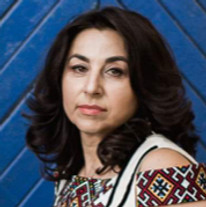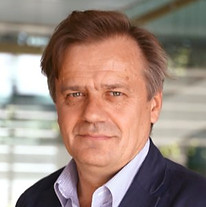| SPEAKERS OF THE 10TH SYMPOSIUM

MYROSLAV MYRONOVYTCH
Political Prisoner; Humanitarian Leader
Lecture “Freedom and Dignity.”
First and foremost, the speech refers to two important changes:
-
the emergence of a powerful fighter capable of significantly paralyzing the Kremlin octopus, replacing the previously subdued Ukraine, and
-
a change in the US itself, which joined Putin in destroying the international order and replaced the language of values with the lexicon of national (if not personal) egoism.
As a result of these two developments, Ukraine was faced with the question of whether to continue fighting for values, which we consider to be, above all, human dignity, and freedom. The second part of the speech will focus on the threats to these values and the prerequisites for guaranteeing dignity and freedom.
Myroslav Myronovytch, Advisor to the rector of the Ukrainian Catholic University (since 2024), President of the Institute of Religion and Society at the same university (since 1997). Founding member of the Ukrainian Helsinki Group. Long-time political prisoner (1977–1987). He headed Amnesty International's structures in Ukraine (1991–1996). President (2010–2014) and honorary president of the Ukrainian Center of the International PEN Club (since 2014). Member of the First of December Initiative Group (since 2011).

LUTZ GOETZMANN
Prof. Dr. med., Analyst in private practice in Berlin (SGPsa/IPV),
Co-founder of the Institute for Philosophy, Psychoanalysis, and Cultural Studies (IPPK)
Lecture “On the Position of the Absolute Idea in the Ethics of Psychoanalysis.”
I would like to start my lecture by introducing Hegel's absolute idea, which is completed in the union of theory (knowledge) and practice (action), and interpret its gradual formation within the framework of the Borromean registers, i.e., within our thought processes. Here, I argue that the ethics of psychoanalysis lie not only in fidelity to desire, but above all in the freedom to choose whether to follow our desires. This also involves the distinction between natural and pure will/desire. I will apply this model to several passages from the diaries of Viktor Klemperer, which he wrote during the German Nazi regime.
Lutz Goetzmann, Prof. Dr. med., analyst in private practice in Berlin (SGPsa/IPV), co-founder of the Institute for Philosophy, Psychoanalysis, and Cultural Studies (IPPK), and co-editor of the journal "Y- Zeitschrift für atopisches Denken". Author of numerous psychoanalytical works, including on psychosomatics and cultural studies, and most recently editor of the climate volume: "Im Angesicht der Katastrophe – Theorie und Aktion in Zeiten des Klimakollaps" („In the Face of Catastrophe – Theory and Action in Times of Climate Collapse”), IPPK-Verlag, Berlin.

OLENA STUPAK

OLENA KUCHYNSKA

DIANE ADDERLEY

Sociodrama
“How Has Meaning Changed During the War in Ukraine?”
Olena Stupak and Olena Kuchynska are members of the Ukrainian Umbrella Association of Psychotherapists (UUAP), both are initiators and participants of the sociodramatic group of Ukrainian psychodramatists under the leadership of Ron Winer and Diana Adderley (Great Britain), which has been operating since September 2022. The group explores and reflects on the social processes, challenges and contradictions experienced by Ukrainians during the Russian war against Ukraine.
Olena Stupak is a teaching therapist and supervisor of the UUAP, head of the psychodrama section of the UUAP.
Olena Kuchynska is a psychodrama therapist and project manager of the psychodrama section “Psychodramatists of the World for Ukraine”. Both live in Kyiv.
Diane Adderley and Dr. Ron Wiener are Senior Sociodrama Trainers with the British Psychodrama Association (BPA). Ron is a former Honorary President of the BPA and Diane is the current Honorary President, with her term running to 2027. They have worked together for many years and currently run a sociodrama support group for Ukrainian therapists which is now entering its 4th year.
In previous years, they have run training workshops across Europe and were both founder members of ISCAN (International Sociodrama and Creative Action Methods Network), a support and practice group for action methods practitioners from around the world to reflect on their work, try out workshop ideas, develop their practice and receive feedback.
RON WIENER

ZVENYSLAVA KECHUR
Doctor-psychotherapist, training therapist and supervisor of the UCP (ECPP) and USP

ROMAN KECHUR
MD, PhD, psychiatrist, psychoanalyst, teaching therapist and supervisor
Lecture “Fate Neurosis and the Path to Freedom.”
In this talk, we combine the social dimension of freedom in the context of Ukraine's hard-won independence with an overview of theoretical contributions by scholars about freedom, as well as material from clinical practice. The theoretical review draws on the work of both psychoanalytic and non-psychoanalytic authors, including cultural theorists, historians, and others. An attempt at the authors' own conceptual reflection on the issue is also undertaken.
Zvenyslava Kechur, Doctor-psychotherapist, training therapist and supervisor of the UCP (ECPP) and USP, psychoanalyst of the Ukrainian Psychoanalytic Society (UPS), a Direct Member of the International Psychoanalytic Association (IPA), group psychoanalyst of the EAP.
Specialization - group and individual psychoanalytic psychodynamic psychotherapy and psychoanalysis.
Editor of translations of articles and books on psychoanalysis (August Rus "Lacan. Introduction to structural psychoanalysis", Timo Storck "Psychoanalysis and psychosomatics"), organizer of International Educational Projects in Psychoanalysis and Psychoanalytic Psychosomatics.
Roman Kechur, MD, PhD, Head of the Department of Psychology and Psychotherapy of the Ukrainian Catholic University, psychiatrist, psychoanalyst, teaching therapist and supervisor of the Ukrainian Union of Psychotherapists and the European Confederation of Psychoanalytic Psychotherapies, Chairman of the Training Council and Secretariat of the Ukrainian Union of Psychotherapists. President of the Ukrainian Confederation of Psychoanalytic Psychotherapies, Chairman of the Board of the Ukrainian Psychotherapeutic University.
